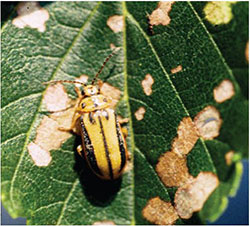Elm Leaf Beetle

This insect feeds on the leaves of all elms but is especially fond of Siberian and American Elm trees. While their feeding generally will not kill the tree, over time it can weaken the trees and leave them open for attack by the elm bark beetle which carries Dutch Elm Disease. These beetles also become a nuisance of households in the fall as they look for a place to overwinter which often can be inside a house and in the spring when they leave their overwintering site to find leaves to feed on. The larva of the beetle is the most destructive and they are about ½” long and dull yellow with two black stripes. When the larva emerge from the eggs they feed for two to three weeks before dropping or crawling to the base of the tree to pupate for 10 days. The adult beetles are about ¼” long, yellowish to olive green with a black stripe along the side of each of the wing covers, black eyes and four black dots on the thorax. While these insects won’t kill the tree they do weaken it and make it unsightly.
To control the insects you have two options. The first is to spray the foliage and thoroughly cover all of it to kill any insects. The second option is to treat the larva when they are near the base of the tree and just prior to pupation. At this time only the trunk of the tree would need to be sprayed. Unfortunately, it’s best to have a community wide approach to treating trees as the beetles will spread from one tree that wasn’t treated to another. Be sure to read the label before application but some active ingredients that are recommended to spray on elm leaf beetles include Carbaryl (Ferti-lome liquid Carbaryl Garden Spray), Cyfluthrin (Bayer Advanced Multi-insect killer), Imidacloprid (Bayer advanced tree and shrub insect control), Neem (Ferti-lome Triple Action Plus), Pyrethrins (Spectracide Garden Insect Killer).

